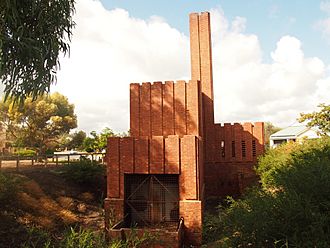Hindmarsh Incinerator facts for kids

Hindmarsh Incinerator, designed by Walter Burley Griffin, viewed from the northwest
|
|
Quick facts for kids General information |
|
|---|---|
| Type | Incinerator |
| Location | Opposite 9 Burley Griffin Boulevard, Brompton |
| Town or city | Adelaide, South Australia |
| Country | Australia |
| Coordinates | 34°53′50″S 138°34′24″E / 34.897228°S 138.573321°E |
| Completed | 1935 |
| Client | Reverberatory Incinerator and Engineering Co. Pty. Ltd |
| Design and construction | |
| Architect | Walter Burley Griffin |
| Designations | South Australian Heritage Register (1980) |
The Hindmarsh Incinerator is an old building in Brompton, a suburb of Adelaide in South Australia, Australia. It used to be a place where they burned rubbish.
This special building was designed by Walter Burley Griffin. He was a famous architect who also designed the city of Canberra. The incinerator was built in 1935 by a company called Reverberatory Incinerator and Engineering Co. Pty Ltd. Its main job was to get rid of household waste.
Contents
What is the Hindmarsh Incinerator?
The Hindmarsh Incinerator is a building that was once used to burn rubbish. It's located in Brompton, a suburb of Adelaide, South Australia. The building is no longer used for burning waste.
Who Designed This Building?
The incinerator was designed by Walter Burley Griffin. He was a very important architect from America. He is famous for designing Australia's capital city, Canberra.
When Was It Built?
The Hindmarsh Incinerator was finished in 1935. It was built by a company called Reverberatory Incinerator and Engineering Co. Pty Ltd.
Why is the Hindmarsh Incinerator Important?
This building is important because of its unique design and history. It shows how people used to deal with rubbish a long time ago.
Recognised for its Design
The Hindmarsh Incinerator is listed on the South Australian Heritage Register. This means it's a special building that needs to be protected. It was added to this list on July 24, 1980.
The Australian Institute of Architects also thinks it's a very important building. They say it's a nationally significant example of 20th-century architecture. This means it's a great example of building design from the 1900s.
 | Lonnie Johnson |
 | Granville Woods |
 | Lewis Howard Latimer |
 | James West |

